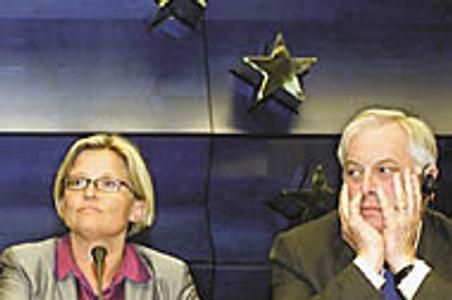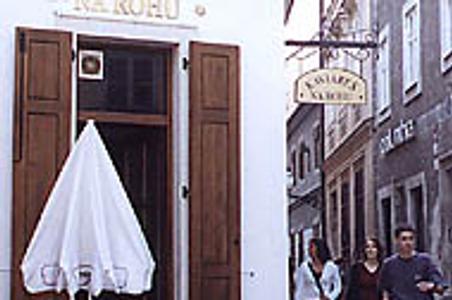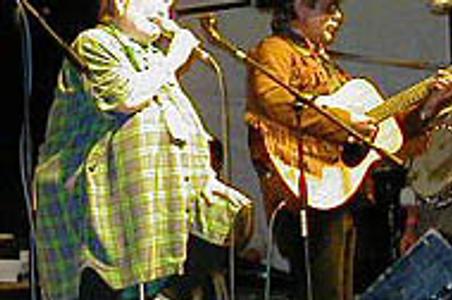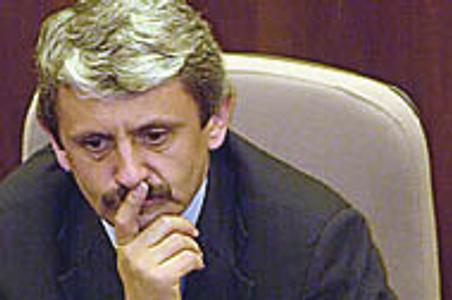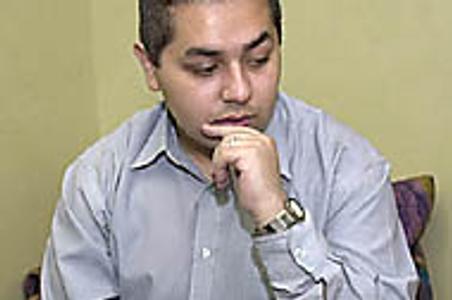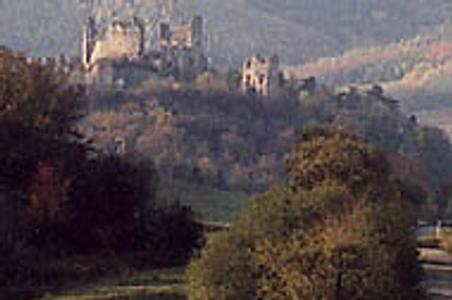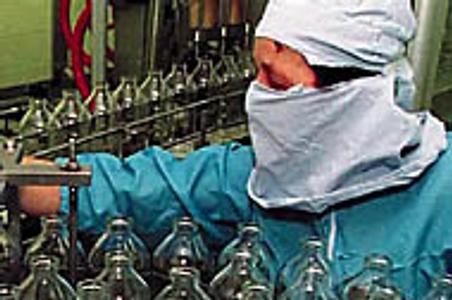Archive of articles - June 2001, page 3
If you desire to read an old article, use the search bar or select the publication date.
NCHZ: No golden egg for potential foreign buyers
Bratislava based Fingroup holding has emerged as the most likely winner of the Slovak national privatisation agency's (FNM) May 30 tender for the privatisation of its minority 40.97% stake in the chemical company Novácke chemické závody (NCHZ).Both FNM officials and analysts said after the announcement of the tender they were expecting few foreign offers for the stake, admitting that Fingroup would likely end up building on its existing 59% stake in the company."We certainly aren't selling a golden egg here, and price will be the dominant criterion bearing in mind it's a minority stake we are offering. We also believe that were foreign investors interested we would have heard from them by now," said Vladimír Dvořák, head of the strategy section at the FNM.
Treading the EU's investment line
The incentives offered by the government to convince foreign investors to settle in Slovakia, including tax holidays and exemptions from environment laws, have drawn the ire of two groups - the European Union and domestic Slovak companies. The former worry that generous tax breaks could lure investors away from EU countries. The latter have complained they are being disadvantaged in a Pyrrhic war among central Europe's developing economies for foreign investment dollars.The debate flared anew last month over a Slovak government promise to grant 10 year tax holidays to steel giant US Steel Košice.If the Slovak government gives the green light to the American firm's request for a five year 100% tax break, followed by a five year 50% tax break, it may be found in violation of Slovak government-approved legislation on financial assistance provided by the state to private firms.
Swiss firm to build power plant
A massive investment of 300 million euros into construction of a two-block brown coal electricity plant in the town of Nováky is hoped to bring relief to soaring unemployment in the region, with two existing blocks of state-owned power utility SE's Nováky plant facing decommissioning in 2005.Swiss company Advanced Power's new plant will not only use the latest, environmentally friendly technologies to reduce what are currently emissions far above agreed EU limits, but will create more than 2,000 jobs at the local Nováky mine.The mine would have to close were there no one to buy the coal after the blocks are shut down. However, Advanced Power has pledged to buy most of the coal after the two blocks are decommissioned.
Review: Kaviareň na rohu: A quiet, shady corner in the city
Those seeking to avoid the mad rush of Michalská ulica in the Bratislava Old Town need only duck down the narrow Zámočnícka street, one of Bratislava's more picturesque thoroughfares. Just 50 metres away, where the road curves down towards Františkánske námestie, ringing mobile phones, techno music pouring out of the main street pubs, and the drone of the masses are all quickly left behind.On this seemingly forgotten street sits the Kaviareň na rohu (Café on the Corner). Above all else, it's quiet - a characteristic the waitstaff readily boasts of."Nothing ever happens here," says one waiter proudly. It's not that he's being disloyal to his employer, it's just that the folks at Kaviareň na rohu understand and appreciate what they have: a quiet corner in the middle of a bustling city centre.
Single mums vs. deadbeat dads, mores
Janka Snopková is a 24 year-old single mother. Raising her two year-old son alone in the northern Slovak city of Považská Bystrica (population 43,500), she is an increasingly common phenomenon in Slovakia.According to statistics provided by the Family Affairs Ministry, 9,500 children were born out of wedlock in 1999, some 17% of all Slovak new-borns for the year. In 1997, 15% were born to single mothers, compared to 10.6% in 1993.But in a country consisting mainly of smaller cities and villages, where conservative values cause many to disparage single mothers, life for women like Snopková is not easy. Her unexpected pregnancy, she says, and the fact that she had no partner with whom to raise the child, led her family to panic.
News Briefs
Slovakia may need to spend $4.4 billion on environmentAsylum-seekers in Slovakia are almost exclusively maleSlota supporters seek ouster of SNS boss Anna MalíkováHamžík re-elected as Party of Civic Reconciliation headNitra Radio Station cuts transmission after bomb threat
Top Pick: Two-day Truck Country Show
When logging on to the web site www.truckcountry.sk (in both in English and Slovak), visitors are met by a series of photos previewing the Truck Country Show, including colourfully decorated big-rig trucks, heavily muscled truck-pullers, saucy country dancers and country music groups, girls in wet T-shirts, bungee-jumpers and guitarists around bonfires.Beginning at 18:00 at Camp Lodenica on Friday, June 15, the Truck Country Show will be a two-day open air event with a western accent. At 20:00, the first Slovak country music groups - Bukasový Masív and Čochciari - joined by the professional dance group Maryland (from Trenčín) will begin their performances. Soon after, the Czech group Zelenáči (Greenhorns) will take the stage. When the professional tunes fade out with the arrival of dusk, intimate acoustic guitar sessions will spring to life around bonfires, lasting till morning.
The Roma in domestic media
Between 1999 and 2000, coverage of the Roma in Slovakia's periodical press experienced a renaissance, while simultaneously showing signs of pluralism. Although coverage of the Romany issue continues to be problematic, more press are now focusing on the minority.The Culture Ministry extends financial subsidies to six Romany periodicals, in 1999 allocating a total of 4,449,000 Slovak crowns for this purpose. The most respected Romany periodical in Slovakia is Romano Ľil Nevo, which has been published in the eastern Slovak town of Prešov since 1991. It is officially a weekly, but is actually published only occasionally. It has a circulation of 8,500 and its editor-in-chief, Daniela Šilanová-Hivešová, is a Slovak writer of Romany fairy tales. In total, only six issues of Romano Ľil Nevo were published between the summer of 1999 and October 2000, due mostly to lack of funds and the irregularity of subsidies from the Culture Ministry.
Rethinking policing: A tall order
It's not often the Slovak police ask the community for advice on how they should do their jobs, but The Slovak Spectator was requested to speak to about 30 senior police officers on June 1 as to how they could improve their media, and thus public, image.True, the request didn't come from them, but from a team of American law enforcement experts who have been leading a week-long seminar in Bratislava with their Slovak colleagues on the 'community partnership' aspect of policing. Simply put, the meetings seem to be about reminding the police that they serve the public, and dissuading them from being yet another burden the average citizen has to bear.Slovakia, like many countries still in 'transition' from Communism to democracy, has two fundamental problems with law enforcement. First, the formal body of laws that govern social behaviour are often inadequate to meet the needs of a modern society, and even when transgressors are caught, the prosecutors and courts are far too slow and sometimes too corrupt to ensure that justice is served. Second, the informal rules that support these laws - widespread agreement, for example, that stealing, bribery, tax evasion or drunk driving is wrong - are not universally accepted. Slovakia is a stew of different religious, ethnic and social groups that has been 'seasoned' by decades of fascism and then Communism. Agreeing on a common, unwritten approach to how we should all behave may take decades.
Letters to the editor
Long live mixed marriagesNothing beats a good old silenceThumbs up for sincerityAmerican friendliness can be misleadingSlovaks should treat their urban animals betterOld national theatre sets the standard for beauty
Developers tap into hot water deposit
The Bratislava-based geothermal research firm Slovgeoterm in May finished three years of tests of a deposit of hot water buried up to 3,000 metres below the surface of eastern Slovakia's Košice district, and pronounced the deposit suitable for use as a source of energy. So suitable, in fact, that the firm's scientists predict the deposit could provide heating for about one-third of Košice city's 250,000 residents for over 30 years.The Košice geothermal deposit, the largest on the European continent, has a mean temperature of 135 degrees centigrade, and can be tapped at a rate of 55 to 60 litres per second.Following the Slovgeoterm tests, a joint-stock company named Geoterm Košice will be formed by the end of June with a basic capital of 306 million crowns ($6 million). The new firm will comprise shareholders such as Slovgeoterm, Košice City Hall and Slovakia's giant gas monopoly, Slovenský plynárenský priemysel (SPP), with the latter contributing over 99% of the funds. The Slovak Geoterm backers are also courting French and Icelandic investors.
Top Pick: 2001 Water Sprite Festival
The water sprite, says Slovak legend, is a long-haired creature dressed in green tuxedo and top hat who lives in rivers and streams. Evil by nature, he seizes and drowns anyone daring to get too close to the water's edge.The 2001 Water Sprite Festival, organised by the Devínska Brána association in Bratislava on Saturday, June 9, will keep with the Bratislava tradition of providing amusement for both the old and the young during its Water Sprite Parade. The tradition dates back to the 18th century, when local fishermen would parade Ferko, the good Bratislava water sprite, through town. Unlike his evil contemporaries, Ferko only drowns 'bad' people, specifically cheats and thieving members of the town council.The parade begins on the Petržalka side of the Danube river, at the Aréna Theatre (at the end of Starý most [Old Bridge], next to the Lunapark area). Slovak mime Milan Sládek will perform at 14:00, and will later join other festival participants in front of the Slovak National Museum on Vajanského nábrežie 2 as they await the arrival of Ferko.
President's speech self-serving, says coalition
President Rudolf Schuster had warned the public in the weeks leading up to his state-of-the-nation speech that he would be sharply critical of the Mikuláš Dzurinda government, and the content of his address before parliament May 25 lived up to its billing. Some members of the president's political audience, however, said they were disappointed that many of the criticisms heaped on the cabinet seemed to spring more from personal frustration than from dispassionate judgement, and that Schuster's evaluation of the government's performance had lacked an august, 'presidential' tone.Schuster reserved most of his criticism for relations between the Presidential Palace and the Government Office, and singled out Prime Minister Dzurinda for special mention.
Reporter Ivan Hriczko: Embodying the hopes of a nation
KOŠICE: TV reporter Ivan Hriczko had just finished his first news broadcast for a Slovak TV network when a woman called the station. She asked to speak to "that darker-skinned reporter".Eager for feedback, Hriczko jumped to the phone and introduced himself: "Hello, Ivan Hriczko speaking. How can I help you?" The woman burst out: "Jesus, you can speak Slovak so well! Where are you from?" "Košice," he replied. "Yes, yes, but what's your nationality?" she pressed on.
Around Slovakia
School bus full of children runs into a ditchRoma kids skip school to sell sandSenior citizen beaten with his own crutchHusband forces wife to play Russian roulette
SARIO investment agency nears collapse
SARIO, the government's key tool for luring wealthy foreign business people to invest in Slovakia, was facing bankruptcy at the end of May after the government failed to transfer its 50 million crown ($1 million) budget for 2001 onto its accounts.The ignominious position of SARIO, Slovakia's national investment agency, drew criticism from investment experts and foreign businesses, who said the government's inability to solve SARIO's financial troubles cast doubt on the likelihood of its bringing foreign direct investment (FDI) to Slovakia, and thus boosting the stagnant economy."How does the government want to attract foreign investment to Slovakia when they can't even keep such an agency going?" asked Karol Balog, head of the Agency for Industrial Development and Revitalisation. "The government's main problem is still that they only talk about it [attracting foreign businesses to Slovakia] but don't do anything to make it happen."
Castles mounted to resist Ottoman Turks today in ruins
Built on an outcrop of volcanic rock and lowering over the village below, south-central Slovakia's Fiľakovo Castle seems an intimidating and invincible fortress. But looks are evidently deceiving - in 1554, when 10,000 invading Turkish troops laid siege to it, the citadel fell quickly into Turkish hands, and remained there for the next 39 years.To ward off the expansionist Ottoman Empire, several castles were erected in the late middle ages on modern-day Slovak soil. During the 16th and 17th centuries, troops of the Hungarian Empire struggled constantly against the aggressive intruders; wherever they failed, towns conquered by the enemy had their buildings burned, their valuables looted, their men-folk killed and women raped.Today, ruins are all that remain of that long-ago Slovak Maginot line - the castles were built atop hills within sight of each other to signal approaching enemies. Nevertheless, tours of these historic sites take visitors on an imaginative journey back to another era, when bloody battles were waged for decades on the central European plain.
Scrubbed Imuna tender puts heat on 'small' privatisation
The government's controversial decision May 9 to cancel the results of a privatisation tender for eastern-Slovak health care producer Imuna Šarišské Michaľany, which had been won by the Slovak-American firm Interaqua, has cast doubt on whether the rules are being followed in sales of smaller state companies to investors.The cabinet's Council of Economic Ministers - made up of the Economy, Finance and Privatisation Ministers and Deputy PM Ivan Mikloš - said they had overturned Interaqua's victory because of concern the firm didn't have the money to cover the investments it was obliged to make into Imuna.But Interaqua officials rejected the government's reasoning, and accused it of violating the principle of transparency in the privatisation. "For us, this [cancelling the Imuna tender results] is a standard example of non-transparent privatisation, where the winner was harmed by a decision that was never reasonably explained to him," said Ľubomír Solárik, the head of the supervisory board at Interaqua and the company's spokesman.
- No more photos or bank statements? Slovakia moves to ease residence process
- Weekend: Celebration of fun comes to Malacky Photo
- Top 10 events in Bratislava for foreigners
- News digest: Prosecutor seeks jail for NBS Governor Kažimír as his political support wanes
- Convicted of multiple murders, Slovakia’s mafia boss seeks release from prison
- Slovakia loses another EV model to Spain as Stellantis chooses Zaragoza over Trnava
- Last Week: Slovakia’s central bank governor still faces bribery case verdict
- Slovak female triathlete shatters barriers with historic win at Himalayan event
- No more photos or bank statements? Slovakia moves to ease residence process
- Maria Theresa on the banks of Bratislava
- Weekend: Celebration of fun comes to Malacky Photo
- Top 10 events in Bratislava for foreigners
- News digest: Fico’s bloc wants to save money by restricting electoral access
- 3 free things to do in Bratislava in the next seven days
- Digital Jarvis is real now. He is coming for your to-do list
- Slovakia plans to restrict access to new medicines amid funding shortfall
- Maria Theresa on the banks of Bratislava
- No more photos or bank statements? Slovakia moves to ease residence process
- News digest: Violent gang in Bratislava is under arrest
- 3 free things to do in Bratislava in the next seven days
- The Kremlin’s security agency has a Russian contractor in Slovakia - no one has noticed
- Weekend: Celebration of fun comes to Malacky Photo
- Digital Jarvis is real now. He is coming for your to-do list
- Top 10 events in Bratislava for foreigners
- Maria Theresa on the banks of Bratislava
- A mayor resigns over €2.7 million fraud scandal at town hall
- Show me your moves! Slovak hockey stars share their best pick-up lines
- No more photos or bank statements? Slovakia moves to ease residence process
- He designed Gatwick. But this is his masterpiece
- Fico praises China and Vietnam as models, says liberal democracy has failed
- News digest: Violent gang in Bratislava is under arrest
- The compass points to Kúty, and people are starting to follow
- News digest: Prosecutor seeks jail for NBS Governor Kažimír as his political support wanes
- Slovakia loses another EV model to Spain as Stellantis chooses Zaragoza over Trnava
- Slovak female triathlete shatters barriers with historic win at Himalayan event
- Weekend: Celebration of fun comes to Malacky Photo
- News digest: Fico’s bloc wants to save money by restricting electoral access
- Slovakia plans to restrict access to new medicines amid funding shortfall
- No more photos or bank statements? Slovakia moves to ease residence process
- Top 10 events in Bratislava for foreigners More articles ›


